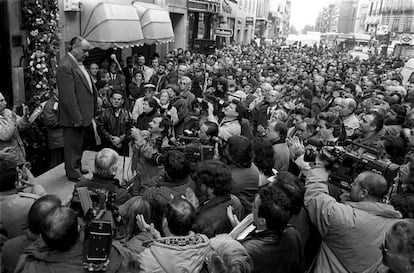The story is well known, and its protagonists have already told it tirelessly. But time passes, and memory grows lethargic. Here’s a reminder. On January 24, 1977, two armed men entered an office on 55 Atocha Street in Madrid and unloaded their weapons, killing labor lawyers Enrique Valdevira Ibáñez, Luis Javier Benavides Orgaz and Javier Sauquillo; to the student Serafín Holgado and the administrator Ángel Rodríguez Leal. In addition to seriously injuring four other people. Behind the massacre, which ended up becoming a key moment in the democratic consolidation of Spain, was a far-right group, carried away by the ideals that, one year and three months after the dictator’s death, refused to be lost. That was one of the worst days of the Spanish Transition, but also a sign that it would not be derailed by violence.
A film presented on Thursday in the Marcelino Camacho auditorium, at the Madrid headquarters of the Workers’ Commissions, aims to help dispel the memory. Seven days in May —The title is a tribute to the renowned film by Juan Antonio Bardem Seven days of January— tells, through a combination of fiction and non-fiction, what happened then, but with a perspective that only the passage of time can provide. “Spain in general, and the left in particular, have difficulty constructing narratives of country and hegemony. Normally we do it from an academic and radically logical perspective, we have not found that creation from audiovisual fiction promotes ways of seeing and interpreting our history without the need to make political cinema,” said Unai Sordo, general secretary of CC OO at the preview. on Thursday, before the gaze of union members, political leaders and rulers, such as the second vice president of the Government, Yolanda Díaz, or the ministers of Digital Transformation and Interior, respectively, Óscar López and Fernando Grande-Marlaska.
The feature film that the institution he directs is promoting tells the story of an Italian filmmaker who arrives in Madrid to prepare a film for the 50th anniversary of the massacre. To do this, he interviews real protagonists—all within the framework of fiction, because they interact as if they were mere characters—who tell him their version of the tragic event while, through the fictional plot, the relationship between the extremism of that time and the from now.
The film will be released on January 31 of this year in which the Government of Spain has decided to organize a hundred events on the occasion of the 50th anniversary of Franco’s death, to which Isabel Diaz Ayuso, and the majority of her party have stated that he was categorically against it. “As his Government is in its final hours, (Pedro Sánchez) has decided to burn the streets and provoke violence with very minority groups, who lately take to the streets when he has a hard time (…). Madrid with democracy and against civil war,” wrote the president of the Community of Madrid on the subject. This film, responded minutes before the screening, the general secretary of CC OO of Madrid, Paloma López, “helps tell the right that remembering is not civil war, it is an obligation, it is democratic culture.”
The idea is shared by the director of the film, Rosana Pastor, actress and film director, winner of a Goya for best new actress and deputy of Podemos from 2016 to 2019: “A fact that was foundational for our democracy cannot be forgotten. . In despair the extreme right takes our hand. We have to work for hope.” In the film he directs, the testimonies of José María Mohedano, companion of the murdered labor lawyers and member of the private prosecution during the trial, are heard; Francisca Sauquillo, lawyer, former social European parliamentarian and sister of Javier Sauquillo, murdered in the attack; Manuela Carmena, former mayor of Madrid, a labor lawyer who by chance was not in the office that night and who recognizes “a debt” to her colleagues; and Alejandro Ruiz-Huerta, the only one of the survivors—the bullet that was going to kill him hit a pen he was carrying in his shirt pocket—who is still alive.
The project, according to its director, aims to reach young people with the story they tell. “This constitutes us and it is important to pass the baton,” he said. Those young people who, dissatisfied with the deterioration of their living conditions, become easy prey for extremism. Just look at the data from the survey titled Spain’s democratic disorder of 40db for El PAÍS, published at the end of last year. 26% of young men preferred, “in some circumstances,” authoritarianism to democracy. Something similar to the CIS data the same year: one in four young people between 18 and 34 years old did not consider democracy to be preferable to any other form of Government. And although he way of working The protagonists of the feature film agree, from the extreme right to come to power has changed, adapting to the current times, the story, says one of them, “maybe it doesn’t repeat itself, but it rhymes.”

